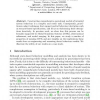Free Online Productivity Tools
i2Speak
i2Symbol
i2OCR
iTex2Img
iWeb2Print
iWeb2Shot
i2Type
iPdf2Split
iPdf2Merge
i2Bopomofo
i2Arabic
i2Style
i2Image
i2PDF
iLatex2Rtf
Sci2ools
116
click to vote
FM
2006
Springer
2006
Springer
Properties of Behavioural Model Merging
Constructing comprehensive operational models of intended system behaviour is a complex and costly task. Consequently, practitioners adopt techniques that support partial behaviour decription such as scenario-based specifications, and focus on elaborating these descriptions iteratively. In previous work, we show how this process can be formally supported by Modal Transition Systems (MTSs), observational refinement, and model merging. In this paper, we study a number of properties of merging MTSs and give insights on the implications these results have on engineering and reasoning about behaviour models. We illustrate the utility of our results on a case study.
Comprehensive Operational Models | FM 2006 | Formal Methods | Partial Behaviour Decription | Practitioners Adopt Techniques |
Related Content
| Added | 22 Aug 2010 |
| Updated | 22 Aug 2010 |
| Type | Conference |
| Year | 2006 |
| Where | FM |
| Authors | Greg Brunet, Marsha Chechik, Sebastián Uchitel |
Comments (0)

